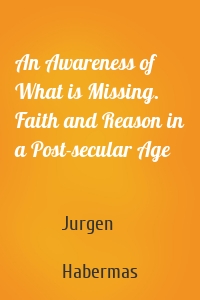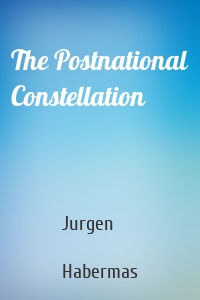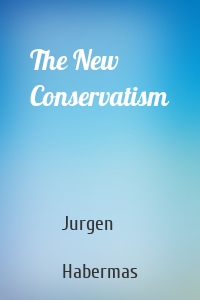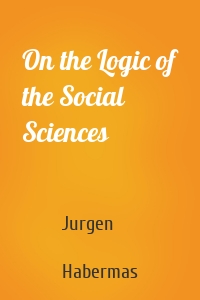Jurgen Habermas
10 кн.
An Awareness of What is Missing. Fa...
In his recent writings on religion and secularization, Habermas has challenged reason to clarify its relation to religious experience and to engage religions in a constructive dialogue. Given the global challenges facing humanity, nothing is more dangerous than the refusal to communicate that we encounter today in different forms of religious and ideological fundamentalism. Habermas argues that in order to engage in this dialogue, two conditions must be met: religion must accept the authority of...
| Автор | Jurgen Habermas |
Philosophical Political Profiles
At the hands of a minor talent, profiles are often flat, two-dimensional outlines of a thinker’s intellectual physiognomy. At the hands of a master like Jürgen Habermas, they can become something far more substantial and profound. With astonishing economy, Habermas sketches his impressions of the giants of recent German thought, several of whom were his personal mentors. For those of his readers accustomed to the demandingly abstract level of his theoretical work, the results will prove a...
| Автор | Jurgen Habermas |
Between Facts and Norms
This is Habermas's long awaited work on law, democracy and the modern constitutional state in which he develops his own account of the nature of law and democracy.
| Автор | Jurgen Habermas |
The Postnational Constellation
Does a global economy render the traditional nation-state obsolete? Does globalization threaten democratic life, or offer it new forms of expression? What are the implications of globalization for our understanding of politics and of national and cultural identities? In The Postnational Constellation, the leading German philosopher and social theorist J?rgen Habermas addresses these and other questions. He explores topics such as the historical and political origins of national identity, the...
| Автор | Jurgen Habermas |
The New Conservatism
Jürgen Habermas is well known for his scholarly writings on the theoretical foundations of the human sciences. The New Conservatism brings to light another side of Habermas's work, showing him to be an incisive commentator on a wide range of contemporary themes. The 1980s have been a crucial decade in the political life of Western democracies in general, and of the Federal Republic of Germany in particular. The transformations that accompanied a shift from 13 years of Social democratic rule in...
| Автор | Jurgen Habermas |
Postmetaphysical Thinking
In this new collection of recent essays, Habermas takes up and pursues the line of analysis begun in The Philosophical Discourse of Modernity. He begins by outlining the sources and central themes of twentieth-century philosophy, and the range of current debates. He then examines a number of key contributions to these debates, from the pragmatic philosophies of Mead, Perice and Rorty to the post-structuralism of Foucault. Like most contemporary thinkers, Habermas is critical of the Western...
| Автор | Jurgen Habermas |
Inclusion of the Other
The Inclusion of the Other contains Habermas's most recent work in political theory and political philosophy. Here Habermas picks up some of the central themes of Between Facts and Norms and elaborates them in relation to current political debates. One of the distinctive features of Habermas's work has been its approach to the problem of political legitimacy through a sustained reflection on the dual legitimating and regulating function of modern legal systems. Extending his discourse theory of...
| Автор | Jurgen Habermas |
Truth and Justification
In this important new book, Jürgen Habermas takes up certain fundamental questions of philosophy. While much of his recent work has been concerned with issues of morality and law, in this new work Habermas returns to the traditional philosophical questions of truth, objectivity and reality which were at the centre of his earlier classic book Knowledge and Human Interests. How can the norms that underpin the linguistically structured world in which we live be brought into step with the...
| Автор | Jurgen Habermas |
On the Logic of the Social Sciences
In this wide-ranging work, now available in paperback, Habermas presents his views on the nature of the social sciences and their distinctive methodology and concerns. He examines, among other things, the traditional division between the natural sciences and the social sciences; the characteristics of social action and the implications of theories of language for social enquiry; and the nature, tasks and limitations of hermeneutics. Habermas' analysis of these and other themes is, as always,...
| Автор | Jurgen Habermas |
Moral Consciousness and Communicati...
In this important book Habermas develops his views on a range of moral and ethical issues. Drawing on his theory of communicative action, Habermas elaborates an original conception of 'discourse ethics', seeking to reconstruct a moral point of view from which normative claims can be impartially judged. Habermas connects communicative ethics to the theory of social action via an examination of research in the social psychology of moral and interpersonal development. He aims to show that our basic...
| Автор | Jurgen Habermas |











